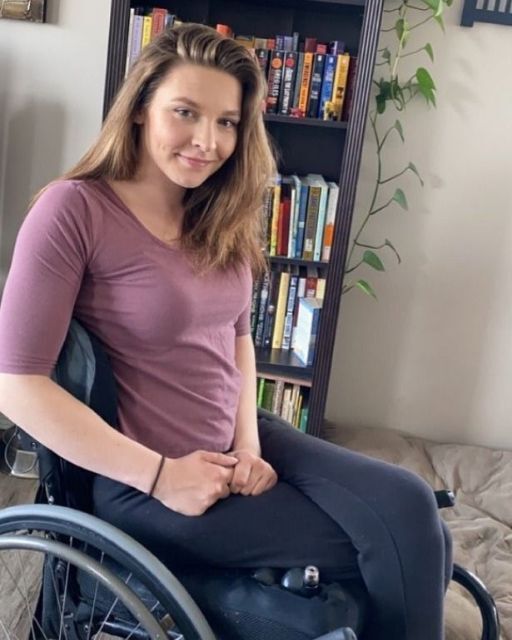I didn’t cry when the doctors told me I’d never walk again. I simply nodded, as if they’d told me tomorrow’s forecast—sunny skies, maybe paralyzed. I didn’t want pity. I didn’t want to hear “you’re so strong.” I just needed the space to grieve something I couldn’t even name.
When the nurse suggested part-time help, I refused. “I’ve got it,” I said. I didn’t. The kitchen turned into a battlefield. Showers became a struggle. Plates and utensils slipped constantly from my hands.
And then Saara arrived.
She wasn’t what I expected—slightly younger, blunt, not sugary-sweet. She didn’t treat me like I was fragile. She just asked, “Where’s the coffee?” and brewed a cup as if she’d been doing it for years.
At first, I kept her at arm’s length. No small talk. No personal questions. She handled the basics and left. But little by little, her dry humor chipped away at me. I began setting aside books and articles for her, laughing at her terrible jokes.
One day, I broke down—over something trivial. I dropped a bowl and couldn’t pick it up. I sat there furious at the world. Saara knelt beside me, carefully gathering the shards. “It’s not about the bowl, is it?” she murmured.
Something cracked open.
I had always said no to caregivers. I didn’t want help. But with Saara, it felt different. It didn’t feel like weakness—it felt like connection. Like maybe I hadn’t lost everything.
Then came the day she told me she might move.
She sat across from me, tea in hand, hair messy as always, sweatshirt hanging loose. But she was serious this time. Saara could make even burnt toast funny, but not today.
“I’ve been offered a position,” she said carefully. “At a clinic. Full-time. Benefits, retirement plan, the whole deal.”
“That’s wonderful,” I managed, though my throat tightened.
Her voice dropped. “It’s not here. Three hours away.”
The words lingered in the room like storm clouds.
I forced a smile. “Of course you should take it. You’ve worked hard for this.”
Inside, though, it felt like someone had punched me. I wanted to beg her to stay, to tell her she’d become far more than just a helper. But I didn’t. I just picked at the edge of my blanket and stayed quiet.
When she brought it up again later, I brushed it off, saying I understood. But the truth was, I was scared—scared of going back to the silence before she came. Before anyone had sat on the floor with me while I cried over something as small as a broken dish.
One afternoon, as we sorted through old photos, she pulled out a picture of me hiking. It was from before the accident—me grinning wide after climbing a mountain, the sky endless behind me.
“You look so happy here,” she said softly.
“I was,” I admitted. “Back then I loved adventure. Now I can’t even make it to the mailbox without stopping to rest.”
Her expression softened. “Do you miss it?”
“Of course I do,” I snapped, then sighed. “Sorry. Yes. I miss it every day. But it doesn’t matter—I can’t go back.”
“No,” she said gently. “But maybe you can move forward.”
She leaned closer. “There are adaptive sports programs here. Wheelchair basketball. Hand cycling. Even climbing. I looked into it—you might actually like it.”
The idea twisted something inside me. Why would she even bother?
“Because I care about you,” she said. “And I think you’re stronger than you realize.”
Her words stayed with me.
A week later, she brought me to one of those programs. The place buzzed with laughter and energy—wheelchair users racing, passing balls, cheering each other on. No pity, no condescension. Just life.
We started small. I tried wheelchair basketball, fumbling with the ball, nearly tipping over more than once. Saara whooped every time I managed to dribble. By the end, I was drenched in sweat, sore, but smiling in a way I hadn’t in months.
Over the weeks, I pushed myself—hand cycling, basketball, even a climbing session. Each time I doubted myself, Saara reminded me I could do more. She believed in me until I started believing in myself.
And then the day came—her last morning.
She stood in the kitchen, packing her things. I wheeled in, trying to sound casual. “Ready?”
“As ready as I’ll ever be,” she said. “What about you? Big game tonight?”
I grinned. “Yeah. First official one. Wish me luck.”
“You don’t need luck,” she said firmly. “You’ve got this.”
After we hugged goodbye, the ache of loss hit—but it wasn’t the same as before. Because this time, I wasn’t left empty. Saara had given me something lasting: the belief that I could still live fully, even if differently.
That night, I played harder than ever. When our team won, I raised my arms high, tears streaking down my cheeks. And in the crowd, there she was—Saara—smiling through the noise.
Later, she found me, beaming. “See? I told you.”
“Thank you,” I whispered, hugging her tight. “For everything.”
She squeezed back. “Promise me one thing—keep moving forward.”
I promised.
Because sometimes, people enter our lives unexpectedly and leave us changed forever. They remind us that loss doesn’t erase possibility, and that moving forward doesn’t mean forgetting—it means choosing to live again.
